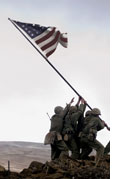《父辈的旗帜》又是一部东京大审判
(单词翻译:单击)
 电影《父辈的旗帜》》("Flags of Our Fathers")是根据同名小说改编的。这部作品的本意是呈现宏大战争中,6名美国士兵如何面对战争的现实、血腥的死亡以及偶然、荒诞地成为“硫磺岛英雄”的历史命运。作者詹姆斯-布拉德利在书中写道他70年代留学日本,邀请参加过“硫黄岛”战争的父亲到日本转一圈,父亲谢绝了,沉痛地说:“他们(日本士兵)折磨我地哥们儿,他们割下他的生殖器塞进他的嘴里,我可不去那个可怕的国家。”
电影《父辈的旗帜》》("Flags of Our Fathers")是根据同名小说改编的。这部作品的本意是呈现宏大战争中,6名美国士兵如何面对战争的现实、血腥的死亡以及偶然、荒诞地成为“硫磺岛英雄”的历史命运。作者詹姆斯-布拉德利在书中写道他70年代留学日本,邀请参加过“硫黄岛”战争的父亲到日本转一圈,父亲谢绝了,沉痛地说:“他们(日本士兵)折磨我地哥们儿,他们割下他的生殖器塞进他的嘴里,我可不去那个可怕的国家。”但是好莱坞的知名导演克林特-伊斯特伍德执导的、大导演斯皮尔伯格担任监制的好莱坞大片为了商业利益,在史实的处理上,并没有遵循原著,不能不说是一个无奈。
From Academy Award-winning director Clint Eastwood ("Million Dollar Baby," "Unforgiven") comes the World War II drama "Flags of Our Fathers," produced by Eastwood and Academy Award winner Steven Spielberg ("Saving Private Ryan," "Schindler's List").
February 1945. Even as victory in Europe was finally within reach, the war in the Pacific raged on. One of the most crucial and bloodiest1 battles of the war was the struggle for the island of Iwo Jima, which culminated2 with what would become one of the most iconic images in history: five Marines and a Navy corpsman raising the American flag on Mount Suribachi.
The inspiring photo capturing that moment became a symbol of victory to a nation that had grown weary of war and made instant heroes of the six American soldiers at the base of the flag, some of whom would die soon after, never knowing that they had been immortalized. But the surviving flag raisers had no interest in being held up as symbols and did not consider themselves heroes; they wanted only to stay on the front with their brothers in arms who were fighting and dying without fanfare3 or glory.
"Flags of Our Fathers" is based on the bestselling book by James Bradley with Ron Powers, which chronicled the battle of Iwo Jima and the fates of the flag raisers and some of their brothers in Easy Company. Bradley's father, John "Doc" Bradley, was one of the soldiers pictured raising the flag, although James never knew the full extent of his father's experiences until after the elder Bradley’s death in 1994.
capturing 俘获 weary adj.令人厌烦的
immortalize v.不灭,不朽 chronicle v.编入编年史
 收听单词发音
收听单词发音
1
bloodiest

|
|
| adj.血污的( bloody的最高级 );流血的;屠杀的;残忍的 | |
参考例句: |
|
|
|
2
culminated

|
|
| v.达到极点( culminate的过去式和过去分词 ) | |
参考例句: |
|
|
|
3
fanfare

|
|
| n.喇叭;号角之声;v.热闹地宣布 | |
参考例句: |
|
|
|
- 上一篇:肖申克的救赎:微暇未遮白玉之美1
- 下一篇:霍金客串电影《超越地平线》演自己




